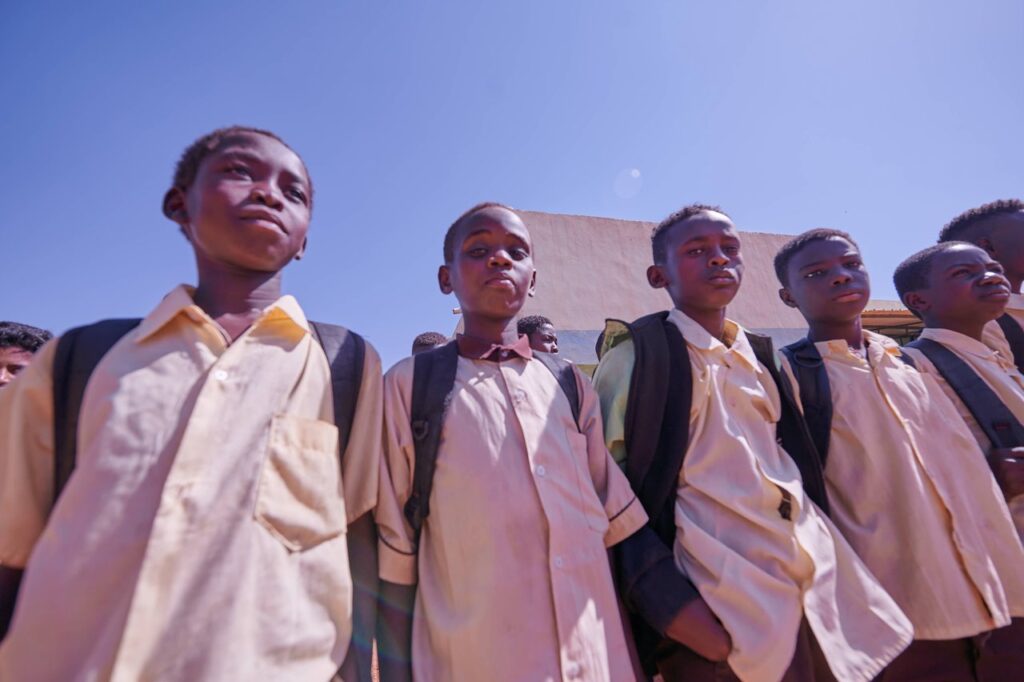Sudan Media Forum: War disruption to education puts children at risk of becoming a ‘lost generation’

School students in Sudan (File photo)
Sudan Media Forum Joint Editing Room – Compiled by Sudans Reporters
Before the war, eleven-year-old Rehab from Khartoum used to wake her mother early to help prepare her school uniform and booklets. She dreamed of becoming a paediatrician and wrote that on every notebook. Today, she sleeps on the floor of a school, repurposed for the displaced, in Wad Madani, without access to books or classrooms. Her only school supply is a pen with no ink, which she uses to draw on her palm.
Rehab is one of millions of children across Sudan whose futures have been upended by war. Since April 2023, schools across the country have shut down, forcing students out of education. Many remain in Sudan without basic learning materials. Others are scattered across neighbouring countries without documents or access to alternative schooling.
According to UNICEF figures from March 2025, around 17 million children in Sudan have been out of school for two years. The agency says about 90 per cent of school-aged children, nearly 19 million, now lack formal education. One million children dropped out in 2023 alone.
The Sudanese Teachers Committee warns this is the worst education crisis in the country’s history. Sudans Reporters spoke with Dariya Mohammed Babiker from the committee’s executive office to assess the impact on students and teachers alike.
Babiker said the war has deepened existing problems. “Before talking about education in light of the war and the loss of the future of students, it is necessary to recognise that education has been suffering from basic problems and structural imbalances since independence,” she said.
She added that education spending has long remained between one and two per cent of the national budget. “The educational process stopped completely in large parts of Sudan. Even where study resumed, it was not as required, which affected the quality of education and its outputs.”
“The war deprived thousands of students of their right to education,” Babiker said. She cited UNICEF reports stating that “more than 16 million students are outside the walls of schools.” Some, she warned, have joined armed groups, either aligned with the army [Sudanese Armed Forces] or the RSF [Rapid Support Forces].
“Schools were destroyed and turned into military barracks or cemeteries, and the bookstores were burned,” she said. “About 50 per cent of students did not sit for the last Sudanese certificate exams, especially in RSF-controlled areas.”
She also warned the 2024 cohort faces the same fate. “There are three payments accumulated for the first grade of primary school, with millions rebounding to illiteracy due to the suspension of education and the deterioration of economic conditions.”
The committee is calling for a neutral national body to coordinate education. “Education in conditions of war, emergencies and disasters needs special plans and integration of roles between the government, civil society and international entities,” Babiker said.
Babiker said most teachers have been displaced or fled Sudan. “Their salaries have been stopped for more than a year. They lost their homes and property. Their current salaries are not enough for one day, due to inflation and the erosion of the value of the Sudanese pound.”
She said schools are no longer safe. “There are remnants of war, unexploded materials and remains of bodies in some neighbourhoods. There is also the risk of epidemics with the approach of the autumn season and the absence of active health centres after many hospitals went out of service.”
Outside Sudan, many teachers were forced to abandon the profession altogether. “Some had to work in other jobs to support their families. Others were displaced, arrested or killed. This deepened the wounds of the education sector and made its crises worse.”
Sudanese students abroad
In Egypt, Libya and Chad, Sudanese students face high fees and legal obstacles. In Egypt, school costs per child range from 21,000 to 25,000 Egyptian pounds, about 500 US dollars, excluding daily expenses.
One parent told Sudans Reporters: “This is a heavy task.” In some cities, intermediate exam fees reach 7,000 pounds. Many families cannot secure residency papers for their children, threatening their ability to continue school.
Weeks before Egypt’s high school exams, more than 1,500 Sudanese students discovered they had no seating numbers, despite having paid private schools to register them. “The money was wasted, and the school year was lost without a certificate or alternative plan,” said one parent. “We were left watching our children cry, with nothing we could do.”
Another parent added: “We are not asking for the impossible. We just want our kids to study. To live like normal children.”
UNICEF has warned that “Sudan is threatened with the loss of an entire generation if the world does not move now.”

This article, prepared by Sudans Reporters, is published by the Sudanese Media Forum and its member institutions to highlight the scale of the collapse in education amid Sudan’s ongoing war.











 and then
and then